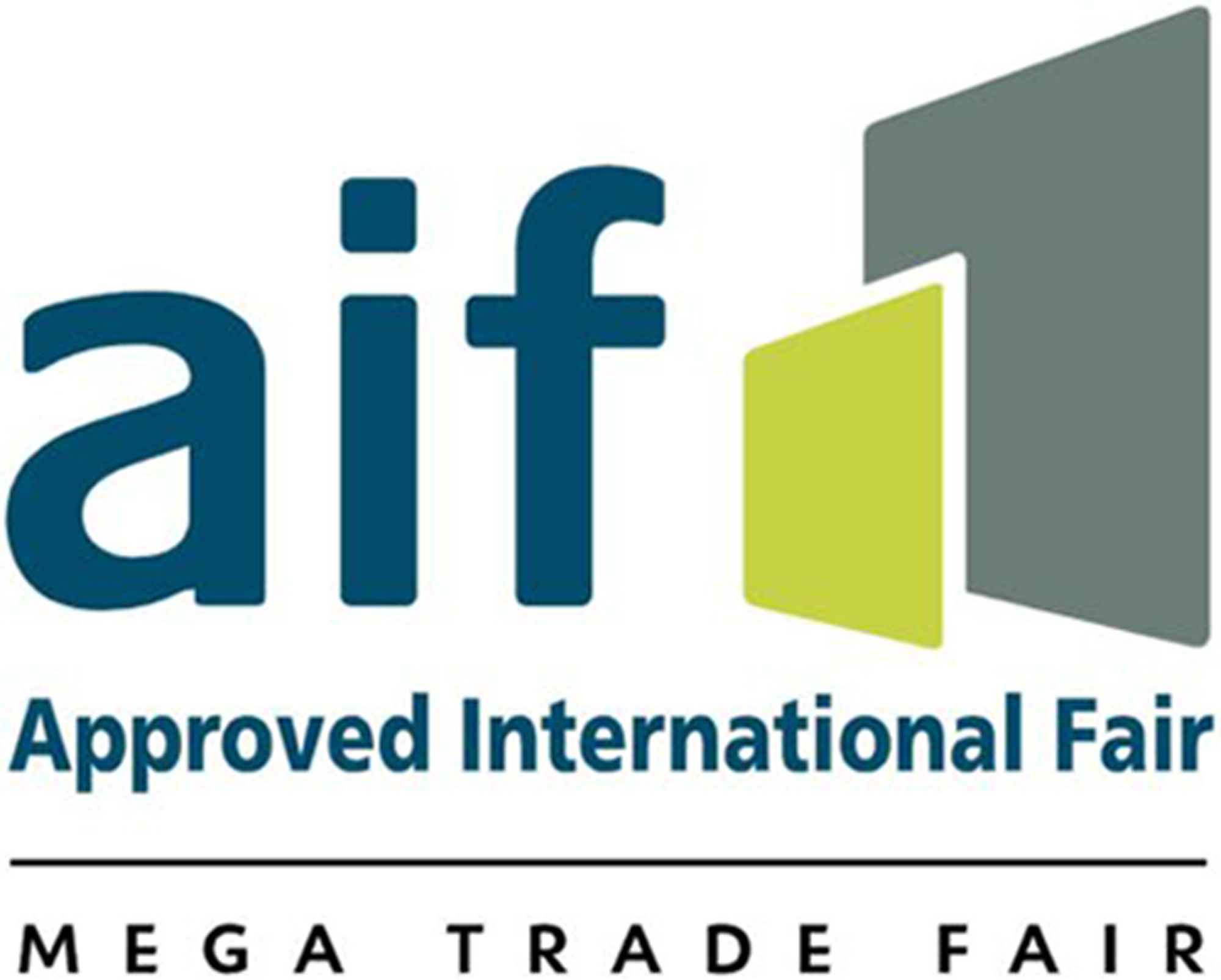The emergence of COVID-19 unleashed a global crisis of unparalleled magnitude, redefining how governments, businesses, and economies operate. It was difficult to pinpoint which industries were affected the most; one of the easy guesses was – the hospitality industry.
In this blog, we’ll explore the impact of COVID-19 on the hospitality industry.
In 2024, the World Travel & Tourism Council projected a record-breaking year for Travel & Tourism, with the sector’s global economic contribution set to reach an all-time high of $11.1 trillion.
The hospitality industry includes hotels, restaurants, travel, and tourism. The virus brought global travel near a standstill, disrupting the booming tourist destinations. As the world turned its focus to safety and social distancing, businesses in the sector had to adapt or face unprecedented economic challenges quickly.
Join us in exploring the evolving landscape of the hospitality industry as we uncover the challenges faced, the innovations born out of necessity, and the resilient spirit that continues to drive this essential sector forward.
Economical Impact
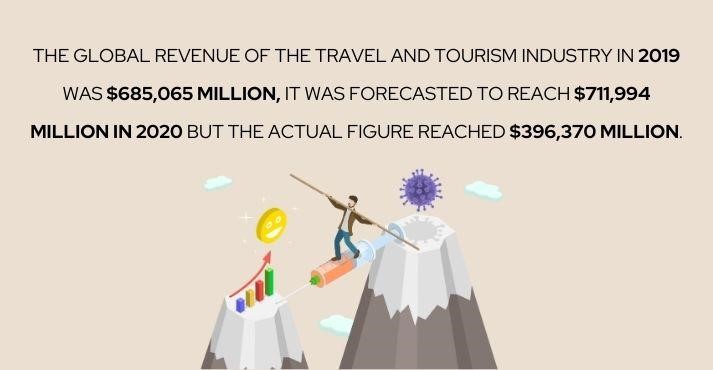
The economic fallout of the COVID-19 pandemic was nothing short of devastating, with the aviation, tourism, and hospitality sectors bearing the brunt of the impact. These industries grappled with critical challenges that have sent shockwaves through the global economy.
Highlighting the Critical Challenges
Here are some of the main challenges faced by the hospitality industry due to COVID-19:
Revenue Declines: The sudden and severe drop in travel and tourism leads to revenue declines. According to Statista, the global revenue of the travel and tourism industry in 2019 was $685,065 million. It was forecasted to reach $711,994 million in 2020, but the actual figure reached $ 396,370 million – indicating the impact of COVID-19 on hospitality industry revenue.
Insolvencies: Small and medium-sized enterprises (SMEs) within these industries faced complex challenges, often with limited financial reserves. Many were on the brink of insolvency, unable to cover operating costs and meet financial obligations.
Job Losses: The human cost of the economic impact was perhaps the most heartbreaking. Job losses in aviation, tourism, and hospitality reached staggering numbers. These sectors, known for their extensive workforce, have been forced to downsize or furlough employees. The toll on livelihoods and communities is immeasurable.
According to Statista, here are the many jobs lost due to COVID-19.
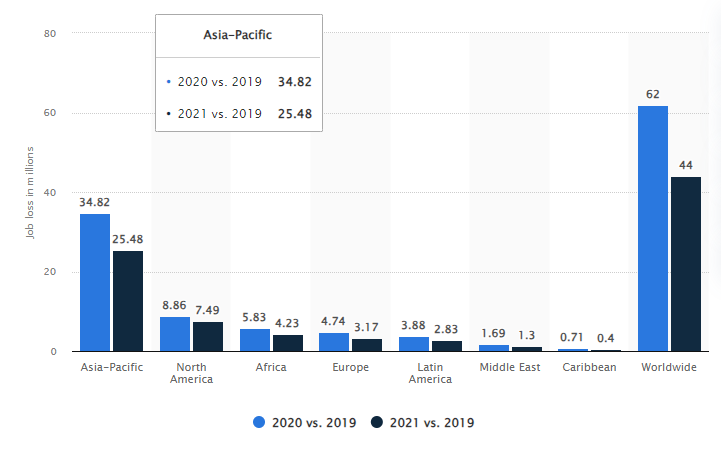
The challenges are related, creating a cycle of financial instability. Airlines struggled to fill planes due to travel restrictions, half-empty hotels, and attractions remained deserted. This intensified the economic impact and highlighted the urgency of coordinated efforts to rebuild these industries.
Operational Impact
The operational impact of COVID-19 on the hospitality sector can be termed disastrous. The challenges were complex, ranging from sustaining day-to-day business operations to navigating complex global supply chains.
Illustrating the Difficulty in Sustaining Operations
The hospitality sector, which encompasses hotels, restaurants, and tourism, thrives on constant activity. However, the pandemic brought a sudden halt to normal operations.
Hotels saw a significant drop in occupancy rates, while restaurants faced restrictions on dine-in services. Travel bans and quarantine requirements further compounded the challenges.
Ensuring the safety of both guests and employees became paramount, leading to additional expenses for health and safety protocols. Maintaining profitability while operating at reduced capacity became a daunting task.
Disruptions and Their Global Spread
The initial disruptions in Asia sent shockwaves throughout the global hospitality supply chains. The region, known for its bustling tourism hubs, witnessed early travel restrictions and lockdowns. As a result, global supply chains that rely on many products and services from Asia felt the impact.
Hotel chains struggled to source linens and amenities, restaurants faced shortages in imported ingredients, and tour operators had to cancel trips. These disruptions quickly spread, impacting businesses on a global scale.
The pandemic highlighted the interconnectivity of the hospitality sector with global supply chains and the challenges of sustaining operations during a crisis of this magnitude.
Financial Impact
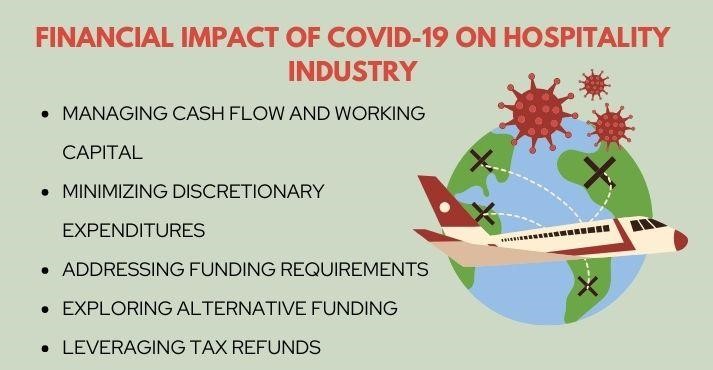
The financial impact of the COVID-19 pandemic on the hospitality sector has been profound. As businesses grapple with unprecedented challenges, managing cash flow, working capital, and profitability has become critical.
Managing Cash Flow and Working Capital
Sustaining operations in the face of reduced revenues and ongoing uncertainties necessitates effective financial management. Prioritizing cash flow and working capital is essential.
Practical steps include creating realistic cash flow forecasts that account for various scenarios. This allows businesses to anticipate challenges, allocate resources judiciously, and maintain essential liquidity.
Minimizing Discretionary Expenditures
It’s imperative to minimize discretionary expenditures. Hospitality businesses should scrutinize their budgets and make prudent cuts without compromising safety and quality. This may involve renegotiating supplier contracts, reducing marketing expenses, or temporarily suspending non-essential projects.
Addressing Funding Requirements
Identifying and addressing funding requirements is crucial. Many businesses in the hospitality sector require additional capital to bridge the revenue gap. Transparent communication with lenders is essential, as renegotiating terms and securing extensions can provide much-needed relief.
Exploring Alternative Funding
In addition to traditional lending, exploring alternative funding sources can be beneficial. These may include grants, investment partnerships, or crowdfunding. Creative solutions can help businesses secure the capital required to stay afloat during these challenging times.
Leveraging Tax Refunds and Financial Relief Measures
Lastly, businesses should proactively leverage available tax refunds and financial relief measures offered by governments. These programs are designed to support struggling industries, and applying for them can provide a lifeline to businesses in need.
By carefully tending to cash flow, controlling expenditures, securing the necessary funding, and utilizing available financial relief, businesses in the sector can navigate the financial challenges and emerge stronger on the other side.
Regional Impact
The COVID-19 pandemic has not affected all regions of the world equally, and the regional impact on the hospitality industry has been distinct. Each region faced specific challenges, performance fluctuations, and predictions that shaped the trajectory of the hospitality sector.
Asia
In Asia, the hospitality industry faced unique challenges brought on by the COVID-19 pandemic. In Q4 FY20, the region witnessed a sharp decline in international and domestic travel, impacting hotels, restaurants, and tourism.
Despite initial optimism for a recovery in Q1 FY21, ongoing waves of the virus and travel restrictions have dampened expectations. Many Asian countries, renowned for their bustling tourist destinations, grappled with the economic consequences of a tourism standstill.
Europe
Europe witnessed a significant decline in industry profitability, with a significant drop in global hotel industry profits. Emergency measures, including travel restrictions and lockdowns, have severely impacted hospitality businesses.
Many hotels, especially in popular tourist cities, were temporarily closed. Here is a clear picture of the financial impact of COVID-19 on the hospitality industry in Europe.
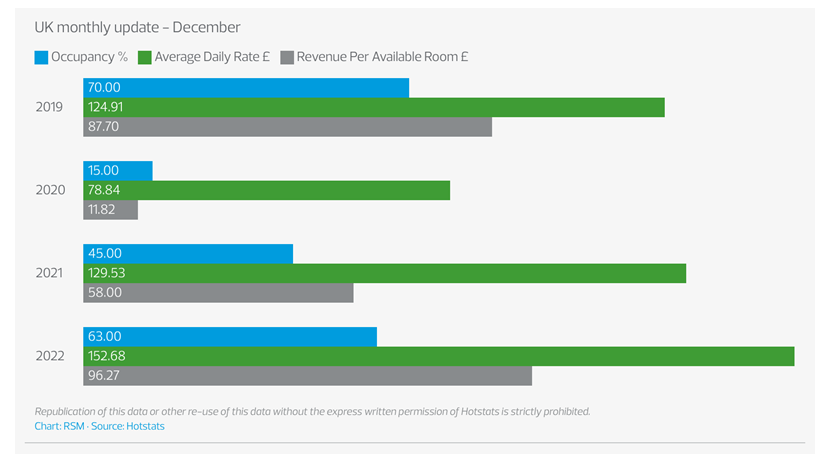
Source: RSM. Source Hotstats
North/South America
North and South America have faced a mixed bag of challenges. While some areas experienced a resurgence in domestic tourism, many regions still grapple with the fallout of international travel restrictions.
Geographic disparities have characterized the industry in North and South America. Some destinations saw a surge in road trips, while others saw extended closures and limited international tourism.
Africa
Africa’s hospitality industry faced a complex situation. The region’s tourism sector, which heavily relies on international travelers, suffered a significant downturn. Travel restrictions and the closure of national borders hit the industry hard.
While some countries have seen a modest recovery, many challenges remain. The African hospitality sector is working on rebuilding its appeal to attract domestic and international tourists, hoping for a more promising future.
The Challenges and the Opportunities
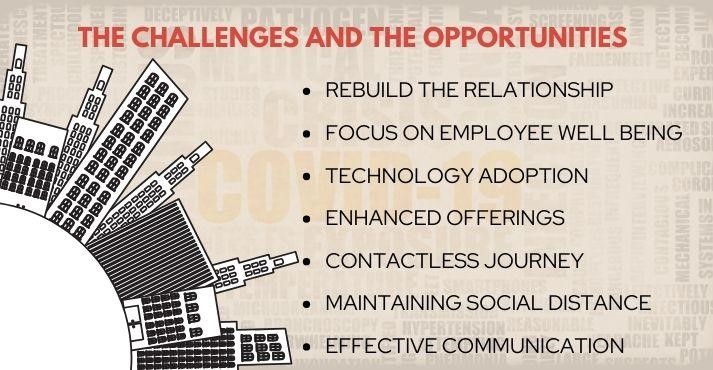
The COVID-19 pandemic has brought challenges and opportunities to the forefront of the hospitality industry. As businesses navigate recovery, they are confronted with a transformed landscape.
Let’s explore the challenges that need to be overcome and the opportunities that can be harnessed.
Rebuild The Relationship
Rebuilding the relationship between the hospitality industry and guests is a substantial challenge. The COVID-19 pandemic has instilled fear and uncertainty, making travelers more cautious.
They require assurance that their health and safety are top priorities. Regaining trust is crucial as the industry navigates through these trying times.
The challenge offers a unique opportunity to forge even stronger relationships. By prioritizing guest safety, businesses can showcase their commitment to their well-being.
Open and transparent communication about safety measures can rebuild trust and demonstrate that the industry is adaptable and resilient. This can lead to more loyal and satisfied customers who feel secure in choosing your establishment.
Employee Well Being
The pandemic has placed the well-being of employees at the forefront. The hospitality industry relies heavily on its frontline workers, and they have faced heightened risks during the crisis.
Ensuring their safety, both physically and mentally, is a considerable challenge. The industry must provide support, training, and a safe working environment for its staff.
Prioritizing employee well-being is a challenge and an opportunity to enhance the guest experience. Happy, motivated employees provide better service, which can set your establishment apart.
You can foster loyalty and create a positive workplace culture by showing care for your workforce. This, in turn, positively impacts guest satisfaction and helps rebuild the industry’s reputation.
Technology Adoption
Adopting hospitality technology in a rapidly changing landscape can be challenging for traditional hospitality businesses. The transition to contactless solutions, online bookings, and digital check-ins requires investments in technology, staff training, and adjustments to existing processes.
This challenge opens doors to enhance efficiency and guest satisfaction. Embracing technology can streamline operations, reduce physical contact, and cater to the tech-savvy preferences of modern travelers.
It offers opportunities for creating a more convenient, personalized, and enjoyable guest experience. Technology adoption can also help businesses adapt quickly to changing circumstances, making them more resilient in the long run.
Enhanced Offerings
The challenge lies in reimagining services to meet safety protocols while maintaining the appeal of hospitality offerings. The pandemic has disrupted traditional dining models, accommodations, and events, necessitating creative adaptations.
This challenge is an opportunity to innovate and diversify offerings. By introducing new and enhanced services, such as outdoor dining, wellness packages, or virtual experiences, businesses can cater to evolving guest preferences.
It’s a chance to provide unique and exciting experiences that set your establishment apart. By remaining adaptable and responsive to changing demands, businesses can captivate guests and boost revenue.
Contactless Journey
Providing a seamless, contactless hospitality journey from check-in to check-out poses challenges, as it involves adopting new technologies, redesigning physical spaces, and changes to operational processes.
This challenge offers an opportunity to create a more convenient, efficient, sustainable, and tech-savvy guest experience. Contactless solutions, such as mobile check-ins and digital room keys, align with the preferences of modern travelers.
They enhance safety and improve the guest’s journey, making it more convenient and enjoyable. A contactless experience can set your establishment apart and attract guests seeking a safer and more efficient stay.
Maintaining Social Distance
Maintaining social distance while providing quality service can be challenging, especially in spaces designed for close interactions, like restaurants and event venues. Adapting to new spatial requirements and guest expectations is a considerable challenge.
This challenge presents an opportunity for creativity and innovation. Businesses can reconfigure spaces, introduce outdoor dining, and utilize technology to ensure social distancing without compromising guest experiences.
Businesses can attract cautious travelers seeking safety and quality service by providing safe yet enjoyable environments. It’s an opportunity to stand out as a safe and accommodating establishment in the post-pandemic landscape.
Effective Communication
Effective communication during a time of uncertainty is a significant challenge. Businesses must convey safety measures, policy changes, and updates to guests and employees clearly, empathetically, and reassuringly.
Transparent and empathetic communication is an opportunity to build trust and loyalty. By keeping guests and staff informed about safety protocols and changes, businesses can alleviate concerns and demonstrate their commitment to well-being.
Effective communication can increase guest satisfaction, repeat visits, and positive word-of-mouth. It’s an opportunity to rebuild relationships and establish a reputation for being responsive, reliable, and compassionate in times of crisis.
Conclusion
As we conclude the challenges and impact of COVID-19 on the hospitality industry, we observe a diverse array of challenges, strategies, and lessons learned during this transformative period.
The challenges of past years have been unprecedented, but they have given rise to remarkable opportunities. By embracing innovative technologies, enhancing safety measures, and reimagining offerings, the hospitality industry is poised for a dynamic resurgence.
As we move forward, we remember past lessons and prepare for a future where the industry’s resilience and adaptability will shine even brighter.
In conclusion, the path to recovery will be paved with financial resilience, operational flexibility, and impactful hospitality marketing strategies. The industry’s journey is far from over, but its commitment to guest well-being, innovation, and adapting to the trends in the hospitality industry will guide the way forward.












